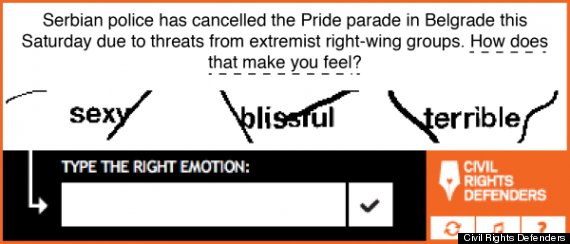
We're all annoyed with CAPTCHAs, short for "Completely Automatic Public Turing Tests to Tell Computers and Humans Apart," also known as those "little boxes that make you type in a word to prove you are human before you can comment or register for a site." Sometimes they're impossible to read. Sometimes they're downright offensive. And with 'bots getting better and better at decoding traditional CAPTCHAs, the question is raised: Is the ability to decode words better than a robot really what makes us human?
Swedish human rights group Civil Rights Defenders has decided it's not, and they've come up with a CAPTCHA to test what they think is the distinguishing factor between humans and computers: the ability to feel compassion. Says Natasha Jevtic Esbjörnson, Civil Rights Defenders' Head of Communications, in the group's press release:
Ironically, we are asked by computers to prove our humanity by interpreting and decoding words. But what really tells us apart is our ability to express emotions. Therefore, we’ve built a CAPTCHA that lets us prove our humanity by showing empathy, while simultaneously highlighting injustice in the world.
The CAPTCHAs have a simple format. They list a human rights abuse (i.e. "In Kosovo, people are tortured in detention"), say "how does that make you feel?" and provide three possible emotional responses. In the case of the Kosovo CAPTCHA, the three answers you can give are "excited", "bothered" and "great." Picking the negative emotion (in this case "bothered") proves to the CAPTCHA that you're a "fully developed human being" and lets you go about your business doing whatever you had to prove your humanity for.
Take a look at the screengrab (below) to see what these CAPTCHAs look like to humans.
LOOK:
However, some of the controversial issues Civil Rights Defenders have chosen to highlight in their CAPTCHA tests -- gay pride issues, for instance -- may turn some websites (and users) off to the CAPTCHA collection. (The collection first launched on October 6th in order to commemorate the banning of Belgrade Pride Day, a gay pride celebration that has been called a "security risk" by Serbia's Prime Minister because of the threats it elicited from right-wing extremist groups.) One CAPTCHA question reads, "The Minister for Human Rights in Montenegro thinks that the existence of homosexuals in Montenegro is bad news. How does that make you feel?" Of the three answers given ("euphoric," "appalled," "proud"), "appalled" is the answer that the CAPTCHA deems correct, thus possibly putting off Montenegrins (and others) who might be "euphoric" or "proud" that their country is taking a stand against homosexuality.
Ignoring the issue of gay rights, some questions the CAPTCHAs pose might be answered differently by people in different parts of the world. As news channel Russia Today (RT) points out, questions like "whether Belarussian [sic] leader Aleksandr Lukashenko should be allowed to stay as President for life" might be answered differently whether or not the user is a pro-Lukashenko. This, in turn, poses serious questions as to whether "cutting off parts of the world that do not share certain [values]" is "in the spirit of the internet."
Of course this means that for tech sites like Wired, writing on the issue has become an invitation to get their comment sections clogged with conspiracy theories. Regarding the CAPTCHAs, a popular opinion seems to be that "[t]his is simply a warm and fuzzy gloss overlaid on Thought Policing." Others are simply annoyed. "Some civil rights obsessive wants me to state my political views in order to enter websites," writes one Wired commentator. "How does this make me feel? Terrible. Irritated. Abusive."
But tech blogs like Gizmodo have pointed out that some variant of the "thought policing" effect might actually provide sites with added benefit: The CAPTCHAs could help keep out "trolls" who can't help but announce that the murder of a human rights activist makes them feel "aroused" instead of "upset."